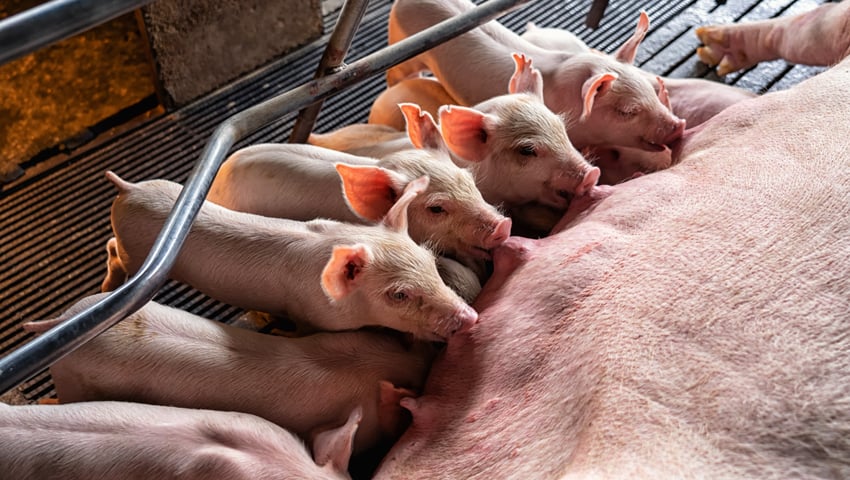Campaigners are calling on the Westminster government to deliver on its commitment to ban the use of prophylactic antibiotic treatments of groups of farm animals, as the EU did in 2022, and to prioritise better husbandry standards.
A new report from the Alliance to Save Our Antibiotics says that the UK government has failed to deliver on its commitment to ban prophylactic antibiotic treatments for farm animals – originally made by then Defra Minister George Eustice MP in October 2018.
After years of delays, the government has finally produced proposals for new legislation on the use of antibiotics on farms. Unfortunately, they will be weaker than the European regulations that came into force in January 2022 despite repeated pledges that it would align with the EU on this issue.
The UK legislation, which is largely based on the 2022 EU rules, includes some positive measures, including a prohibition on using antibiotics routinely or “to compensate for poor hygiene, inadequate animal husbandry or poor farm management”. All prophylactic antibiotic use will be restricted to “exceptional circumstances where the risk of an infection or of an infectious disease is very high and where the consequences of not prescribing the product are likely to be severe”.
Cóilín Nunan of the Alliance to Save Our Antibiotics said, “Some proposed measures are welcome and long overdue. But the government has deliberately weakened the legislation, in comparison to the EU’s, which will allow some poorly run farms to keep on feeding large groups of animals antibiotics, even when no disease is present.
“The government insists that farmers should be allowed to feed groups of animals prophylactic antibiotics because some may still need to make improvements to their management practices to get disease problems under control. At the same time it is saying that farmers cannot use antibiotics to compensate for poor farm management.
“The government’s position is inconsistent and raises serious questions about how seriously the legislation will be implemented in practice”.
Many farms have made progress on reducing antibiotic use meaning that UK farm antibiotic use has been cut by 59% over the past decade, but use per pig is still about twice as high as in France and Denmark, nearly three times as high as in the Netherlands, and over four times as high as in Sweden.
Nunan said, “The government needs to set a new target to cut farm antibiotic use by 40% by 2030. Also, about 75% of UK farm antibiotic use is still for group treatments, so a target should be set to reduce this to less than 30% by 2030.
“Stronger action on antibiotic use and improvements to animal husbandry could deliver major reductions in farm antibiotic use and contribute to tackling the antibiotic-resistance crisis.”
Scientific evidence shows that the overuse of antibiotics on farms has contributed to antibiotic resistance in many different types of human infections. A livestock-associated strain of the superbug Clostridium difficile, called ribotype 078, has become a major cause of infections in humans. In Northern Ireland it is now the most common Clostridium difficile strain causing human infections.
Impact on intensive farming on animal welfare
The Alliance’s report argues that many of the practices of modern intensive farming are putting animals under excessive stress, causing poor health and leading to unacceptable antibiotic use. As reliance on antibiotics is reduced it’s critical that steps are taken to improve animal welfare standards.
Practices such as tail docking of piglets, or the use of farrowing crates, which are used to cage sows from a few days before they give birth until their piglets are weaned, should be phased out. Space allowances for all animals housed indoors should be increased, and enrichment such as straw bedding provided.
Farm animals should not be genetically selected for excessively high productivity as this is often linked with increased health problems:
- The growth rate of broiler chickens has quadrupled since the 1950s, and chickens are now slaughtered when they are aged just 28-42 days. This high growth rate is linked to health and welfare problems, and Dutch data shows that fast-growing breeds receive six to nine times more antibiotics per bird than slow-growing breeds.
- Sows are being bred to produce ever-increasing numbers of piglets. The most productive UK sows now produce an average of 17.16 piglets a litter and 37.56 live piglets a year. Such hyper-prolific sows may not have enough teats, and can struggle to produce enough milk, for all their piglets, making early weaning necessary. The early weaning of piglets, which can be legally weaned when they are just 21 days old, can cause post-weaning diarrhoea and is a major reason for high antibiotic use in the pig industry.
- British dairy cows produced an average of 8,163 litres per cow in 2022, up from 5,151 litres in 1990, and compared with a global average of about 2,500 litres. Genetic selection for high milk yield is linked to health and welfare problems, some of which are treated with antibiotics.
Providing animals with access to the outdoors should be encouraged as the available data suggests this reduces the need for antibiotics. Unfortunately, zero-grazing dairy farming, where cows are kept indoors all year round, is becoming more common in the UK. It is estimated that between 16% and 30% of British dairy farms keep some or all of their cows indoors all year round.
Zero-grazing is associated with higher levels of mastitis, lameness, reproductive disorders, which are all major causes of antibiotic use. A new animal-welfare law should be introduced requiring that all dairy cows have access to pasture during the summer months. Such a law already exists in Sweden.
